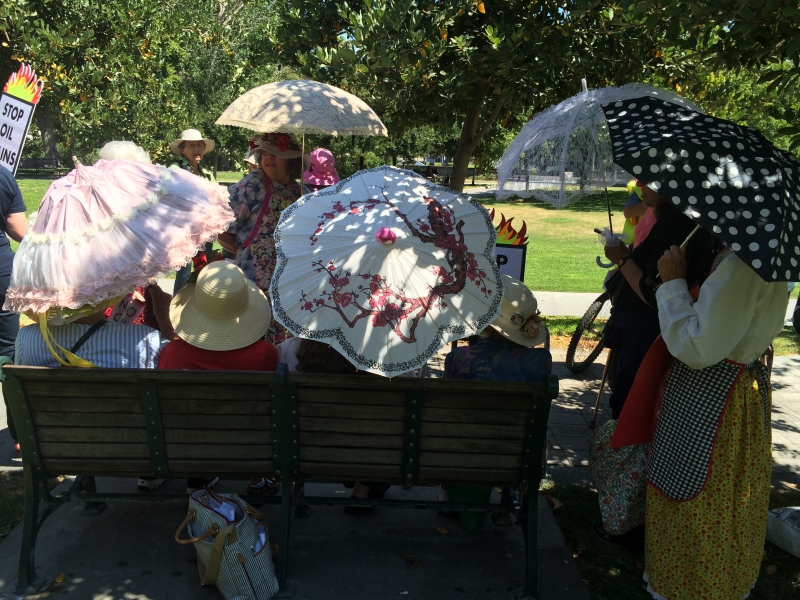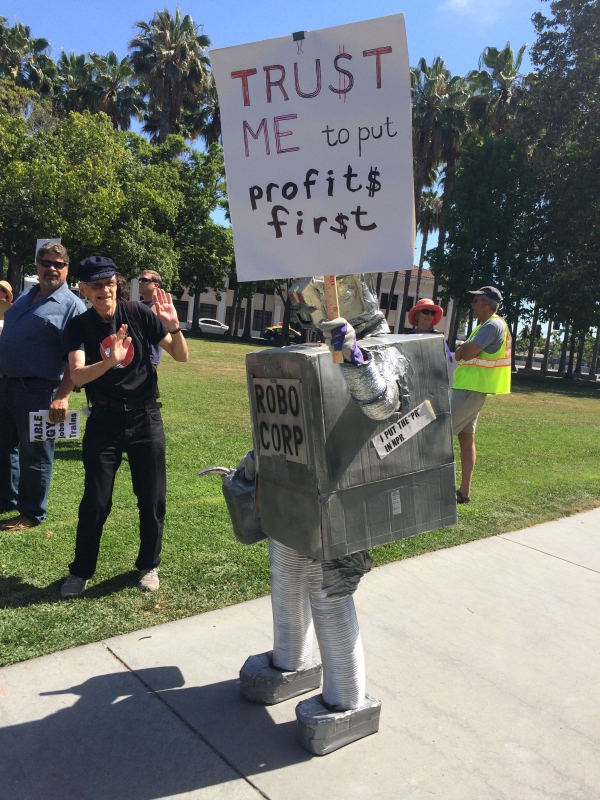From the Open-Publishing Calendar
From the Open-Publishing Newswire
Indybay Feature
Arrests in Martinez as Californians demonstrate against oil trains
Police arrested four Bay Area protesters after they suspended themselves from the Benicia-Martinez railroad bridge to hang a banner protesting oil trains. Photos here are of the protest in San Jose, California. Both protests were part of a week of action against oil trains.
Police arrested four Bay Area protesters after they suspended themselves from the Benicia-Martinez railroad bridge to hang a banner protesting oil trains last week. Elsewhere in California, Raging Grannies in Davis and San Jose enlivened protests there singing out,”No more exploding trains”.
Oil trains go through almost every US state, disproportionately over poorer American communities. The crude oil moving by train is more toxic, explosive, and carbon intensive than conventional oil. It puts millions of Americans and Canadians at risk. Last week there were more than 80 protests and educational events in North America about this danger.
The Lac-Mégantic rail disaster happened July 6, 2013, when a freight train carrying Bakken formation crude oil rolled downhill and derailed, resulting in the fire and explosion of multiple tank cars. Forty-seven people died and many others injured. Last week's events were timed to coincide with the anniversary of that catastrophe.
Oil trains go through almost every US state, disproportionately over poorer American communities. The crude oil moving by train is more toxic, explosive, and carbon intensive than conventional oil. It puts millions of Americans and Canadians at risk. Last week there were more than 80 protests and educational events in North America about this danger.
The Lac-Mégantic rail disaster happened July 6, 2013, when a freight train carrying Bakken formation crude oil rolled downhill and derailed, resulting in the fire and explosion of multiple tank cars. Forty-seven people died and many others injured. Last week's events were timed to coincide with the anniversary of that catastrophe.
Add Your Comments
Comments
(Hide Comments)
The death of 47 residents of Lac-Megantic, victims of an oil train explosion, has been remembered in cities around the country.
Fracking pipelines and bomb trains were denounced. We were reminded that the blast zone extends a half mile on either side of the track. Meanwhile 9 million gallons on crude oil roll along U.S. rails. Refinery expansions involving more rails are vigorously opposed now by coalitions of affected towns and cities. 20,000 negative comments pepper an environmental review jof a refinery proposal. A fiery derailment causes 5,000 Tennesseeans to have to evacuate their homes. The DOT avers that an oil train explosion in a metro area like Houston could kill thousands and cost billions. New, advertised tougher, DOT regs still don't have standards for stabilization, still allow the crude to be hauled in unsafe tank cars, and still don't strengthen requirements for rail inspections.
The Big 7 railroads enjoyed $6 billion in profits in 2008. Thanks to Bakken crude, profits have notched up to $14 billion in 2014. In that time, how much has gone into finding and fixing flaws in rails, switches, and bridges? How much has gone into escrow to pay for a disaster ours derailment? We often hear the hokey statistic that 99.97% of what is shipped arrives safely. How about some meaningful data about what is done with railroad profits?
So, more important than ever, derailment avoidance is the area in which to put resource. Better inspections, stricter maintenance schedules, tighter enforcement by the Federal Railroad Administration.
Sign the attached petition demanding that the FRA use its authority to promote safety, even at the cost of some profit for the railroads. Add a comment so they hear another voice besides the plaintive wail of the railroad lobbyists saying "Trust us, we know what we're doing."
http://petitions.moveon.org/sign/enforce-railroad-health?source=s.fwd&r_by=1718159
Fracking pipelines and bomb trains were denounced. We were reminded that the blast zone extends a half mile on either side of the track. Meanwhile 9 million gallons on crude oil roll along U.S. rails. Refinery expansions involving more rails are vigorously opposed now by coalitions of affected towns and cities. 20,000 negative comments pepper an environmental review jof a refinery proposal. A fiery derailment causes 5,000 Tennesseeans to have to evacuate their homes. The DOT avers that an oil train explosion in a metro area like Houston could kill thousands and cost billions. New, advertised tougher, DOT regs still don't have standards for stabilization, still allow the crude to be hauled in unsafe tank cars, and still don't strengthen requirements for rail inspections.
The Big 7 railroads enjoyed $6 billion in profits in 2008. Thanks to Bakken crude, profits have notched up to $14 billion in 2014. In that time, how much has gone into finding and fixing flaws in rails, switches, and bridges? How much has gone into escrow to pay for a disaster ours derailment? We often hear the hokey statistic that 99.97% of what is shipped arrives safely. How about some meaningful data about what is done with railroad profits?
So, more important than ever, derailment avoidance is the area in which to put resource. Better inspections, stricter maintenance schedules, tighter enforcement by the Federal Railroad Administration.
Sign the attached petition demanding that the FRA use its authority to promote safety, even at the cost of some profit for the railroads. Add a comment so they hear another voice besides the plaintive wail of the railroad lobbyists saying "Trust us, we know what we're doing."
http://petitions.moveon.org/sign/enforce-railroad-health?source=s.fwd&r_by=1718159
We are 100% volunteer and depend on your participation to sustain our efforts!
Get Involved
If you'd like to help with maintaining or developing the website, contact us.
Publish
Publish your stories and upcoming events on Indybay.
Topics
More
Search Indybay's Archives
Advanced Search
►
▼
IMC Network











